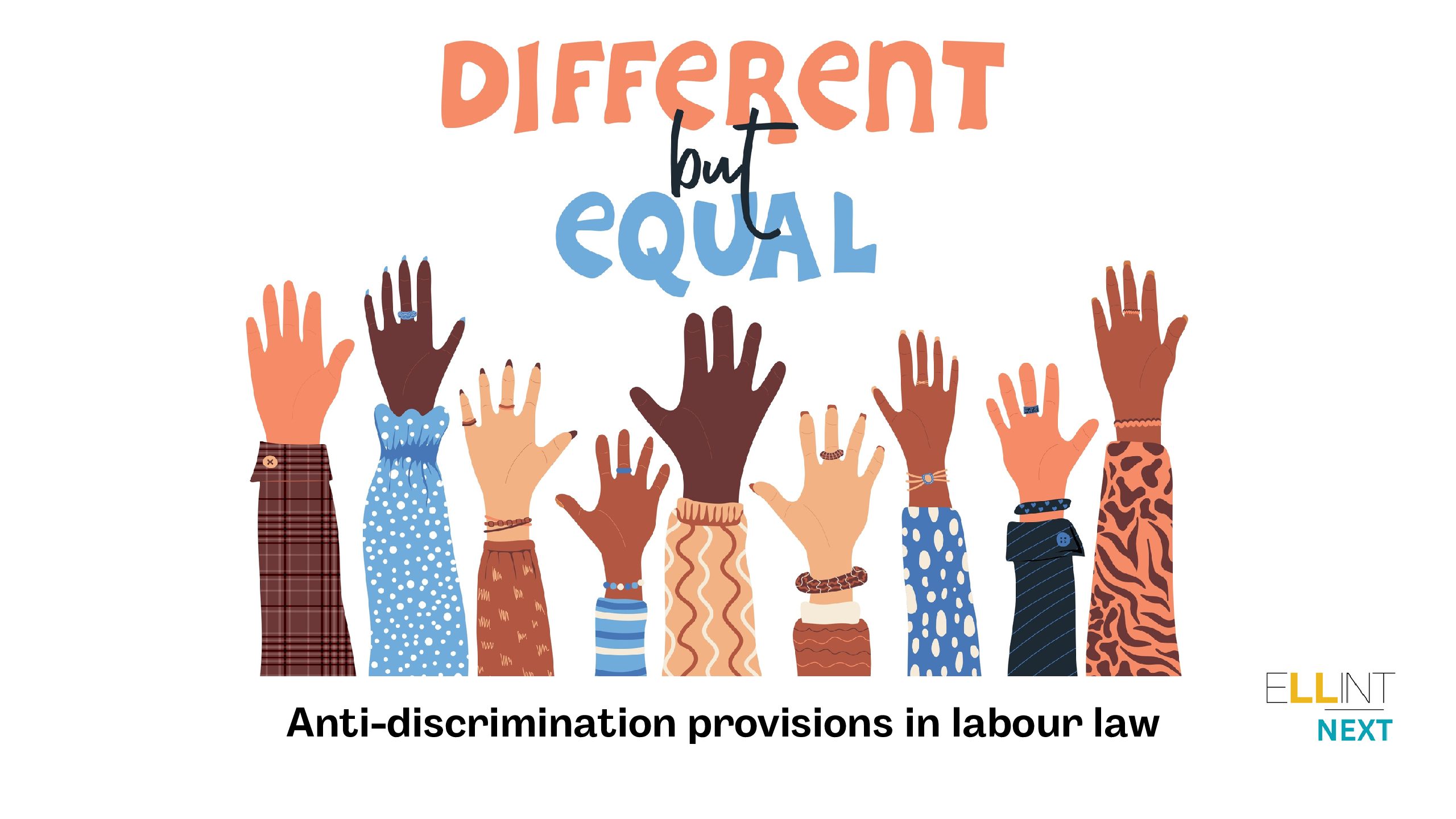
Artikel fra vores ELLINT netværk af Nuria Naranjo og Chiara D’Angelo. Hvis du ønsker juridisk rådgivning, er du velkommen til at kontakte os.
Discrimination in the workplace is a very broad and complex issue, both because it can be based on various factors (e.g. health, gender, sexual orientation, age, religion, race, etc.), and because it can occur at all stages of the employment relationship, from the recruitment phase to possible termination.
In addition, numerous sources of legislation now govern this issue, both in domestic law and in the EU context.
This article which you can download, provides an overview of how discrimination in the workplace is regulated in Italy and Spain, together with some reflections on possible future developments in this area.
Question 1. Where is the discrimination prohibition principle located in the Spanish/Italian legal system? What about the application of this principle to the labour field?
SPAIN
The principle of non-discrimination and equality before the law is regulated in Article 14 of the Constitution. Based on this article, Spaniards are protected against any kind of discrimination based on: birth, race, gender, religion, opinion or any other personal or social condition or circumstance.
Apart from this general approach, under an employment perspective, article 35 of the Spanish Workers Statute provides that employees are protected from discrimination based on gender at the workplace.
Moreover, Article 33 of Law 15/2022 of equal treatment and nondiscrimination, encourages companies to promote conditions of equal treatment and non-discrimination within the company.
Furthermore, and based on Law 3/2007 for effective equality of men and women, the following regulation was passed: i) Royal Decree 902/2020 on equal pay for women and men, which requires companies to have a remuneration register for all their personnel, including managers and senior managers (not management), indicating the average salary, allowances and additional benefits disaggregated by gender, ii) Royal Decree 901/2020 regulating the equality plans, which requires companies, with more than 50 employees, to implement, after prior negotiation, measures aimed at avoiding any type of labour discrimination between women and men, as well as to promoting working conditions that prevent sexual harassment and harassment based on gender, establishing specific procedures for their prevention and for dealing with any complaints or claims from employees who have suffered those types of harassment.
And, last but not least, Law 4/2023, for the real and effective equality of trans persons and for the guarantee of the rights of LGTBI community, provides that employers must comply with the obligation of taking proactive measures against discrimination and violence directed towards the LGTBI community – failing to do so will result in employer’s liability.
ITALY
The principle of non-discrimination is first of all expressed in the Constitution, which in articles 2, 3, 32 and 41 protects the inviolable rights of the person, promotes equal dignity and equality, the right to health, and to engage in economic enterprise.
Moreover, the Civil Code, in Article 2087, obliges the employer to adopt measures to protect the physical and moral integrity of the personal at work.
Finally, Legislative Decree 215/2003, Legislative Decree 216/2003 and Legislative Decree 198/2006 implement the principles of fair treatment in employment relations.
Question 2. What’s the Workers Statute implementation of the non-discrimination principle?
SPAIN
Article 17 of Workers Statute provides that any regulation, provisions of collective bargaining agreements, individual agreements and unilateral decisions of the employer shall be considered null and void in case they result in direct or indirect discrimination, based on the following grounds: age, disability, gender, origin (racial or ethnic), marital status, social status, religion or beliefs, political ideas, sexual orientation, identity, gender expression, sexual characteristics, trade unions membership or lack of it, family ties with persons belonging to or related to the company and language.
In addition, all those decisions by the employer that involve unfavourable treatment of employees and discrimination shall be considered null and void too, when they are taken as retaliation against a complaint made to the company or a complaint filed before an administrative or judicial authority aimed at demanding compliance with the principle of equal treatment and non-discrimination.
Besides, all terminations based on any of the causes of discrimination prohibited by the Constitution or by law, or terminations breaching the fundamental rights and freedom of the employee, shall be null and void, as set out in Article 55 of the same law. In these cases, the employee will be reinstated and lost wages will be awarded.
ITALY
The Workers’ Statute, in Article 15, establishes the principle of the nullity of discriminatory acts based on trade union, political, religious, racial, language, sex, disability, age, nationality, sexual orientation, and personal opinion grounds. This rule applies to all acts relating to the management of the employment relationship, including job changes, transfers and dismissals. If a court declares an act discriminatory and therefore null and void, it will be considered as never having been adopted and the employer may be required to pay compensation.
Question 3. What are the current trends regarding discrimination in the workplace in your Member State?
SPAIN
ITALY
As regards discriminations on health grounds, there are numerous judicial decisions establishing that a worker who is absent for long periods because of his disability has the right to keep his job under more favourable conditions.
In addition, from a legislative point of view, gender equality is a hot topic. In fact, the recent Law 162/2021 provides that companies with over 50 employees are required to produce a “Biennial Report on the situation of male and female personnel” (called “Rapporto biennale sulla situazione del personale”), to certify the fairness of treatment implemented by the company towards male and female workers.
At the same time, Law 162/2021 also provides for the “Gender Equality Certification” (called “Certificazione della parità di genere”): a document issued by a certifying body, after an assessment phase, certifying that the company has adopted a management plan to ensure equal opportunities over time. This document is voluntary but may have very important economic and reputational advantages for companies.
Question 4. Overall, what kind of approach do companies have regarding the issue of anti-discrimination in the workplace? What about the future perspectives?
SPAIN
During the last few years (from 2021), we have been giving advice to large companies (more than 50 employees) in order to help them in implementing their own equality plans, together with their remuneration register, and remuneration audit with success. Consequently, they have been seeking new strategies to apply in their companies to avoid any kind of discrimination.
Moreover, for small and large companies, it is mandatory to create their own sexual harassment and harassment based on gender protocol in order to prevent the commission of crimes and other misconducts against sexual freedom and moral integrity at work, so the small and medium companies in Spain (PYMES), the most common type of companies in Spain, have been obliged to do an extra effort in order to comply with this new regulation and undoubtedly, avoid the applicable sanctions in case the Authorities discover that no protocol has been elaborated.
Nowadays and in near future, large companies will have to implement, in case they were not able to do it before (since March 2023), a protocol that allows the company to know how to act when a possible situation of violation of LGTBI rights is detected (e.g. homophobia, transphobia or lesbophobia).
And, for sure, all ESG Directives that will be applicable to the labourrelations in the following years, will be another challenging process for us because, as labour experts, we do not really know (at least at this moment) how this regulation would affect the daily life of Spanish companies.
ITALY
It depends on the size of the company. Certainly, larger companies are more sensitive to the issue and therefore more likely to implement measures to prevent and sanction harassment, such as policies, training and awareness campaigns. It is not the same for smaller companies, which are likely to become more aware of the issue in the future. In any case, there is a growing awareness of the issue, also thanks to recent legal figures that are of interest to companies, such as the “Biennial Report on the situation of male and female personnel” and the ” Gender Equality Certification”.
Conclusion
Discrimination in the workplace is a complex issue that Italy and Spain are addressing through their legal frameworks, grounded in their constitutional principles and reinforced by specific labour laws. Both countries have implemented measures to combat discrimination, particularly focusing on gender equality, LGTBIQ+ rights and other ways of discrimination. As European law evolves, businesses and companies will have to stay updated and promote practices aligned with labour human rights standards that will guarantee safe and inclusive workplaces.
AUTHORS
Nuria Naranjo is an attorney-at-law at álvarez lentner, the Spanish member
of Ellint and based in Madrid. She is qualified to practice law in Spain, after doing her legal practice studies at Carlos III University. She provides assistance, both in and out court, and in most cases to companies but also to employees. And last but not least, she is willing to write appealing juridical articles for other lawyers colleagues and clients to keep them up to date.
Chiara D’Angelo is an associate at Lexellent, the Italian member of Ellint, and based in Milan. She is a graduate of the University of Siena and a member of the Milan Bar Association. She provides assistance, both in and out of court, in employment law matters, with particular reference to personnel management, employment and self-employment relationships and individual dismissals. She is also involved in research and updating activities for the publication of juridical articles and articles of general interest.



Tak til følgende bidragsydere til hjemmeside: Steen Evald (fotografi), Stine Heilmann(fotografi), Count Pictures (video), Kunde & Co. A/S (design), WeCode A/S (kodning)